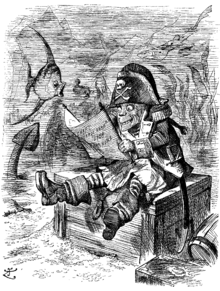Davy Jones' Locker
| Davy Jones's Locker | |
|---|---|

Davy Jones's Locker, by John Tenniel, 1892
|
|
| Genre | Nautical folklore |
| Type | Euphemism for sea floor, or resting place for sailors drowned at sea. |
Davy Jones' Locker, also Davy Jones's Locker, is an idiom for the bottom of the sea: the state of death among drowned sailors and shipwrecks. It is used as a euphemism for drowning or shipwrecks in which the sailor(s)'s and/or ship(s)'s remains are consigned to the bottom of the sea (to be sent to Davy Jones's Locker).
The origins of the name of Davy Jones, the sailors' devil, are unclear, with a 19th-century dictionary tracing Davy Jones to a "ghost of Jonah". Other explanations of this nautical superstition have been put forth, including an incompetent sailor or a pub owner who kidnapped sailors.
The earliest known reference of the negative connotation of Davy Jones occurs in the Four Years Voyages of Capt. George Roberts, by the author Daniel Defoe, published in 1726 in London.
Some of Loe's Company said, They would look out some things, and give me along with me when I was going away; but Ruffel told them, they should not, for he would toss them all into Davy Jones's Locker if they did.
An early description of Davy Jones occurs in Tobias Smollett's The Adventures of Peregrine Pickle, published in 1751:
This same Davy Jones, according to sailors, is the fiend that presides over all the evil spirits of the deep, and is often seen in various shapes, perching among the rigging on the eve of hurricanes:, ship-wrecks, and other disasters to which sea-faring life is exposed, warning the devoted wretch of death and woe.
In the story, Jones is described as having saucer eyes, three rows of teeth, horns, a tail, and blue smoke coming from his nostrils
The origin of the tale of Davy Jones is unclear, and many conjectural or folkloric explanations have been proposed:
He’s gone to Davy Jones’s locker, i.e. he is dead. Jones is a corruption of Jonah, the prophet, who was thrown into the sea. Locker, in seaman’s phrase, means any receptacle for private stores; and duppy is a ghost or spirit among the West Indian negroes. So the whole phrase is, "He is gone to the place of safe keeping, where duppyy Jonah was sent to."
...
Wikipedia
